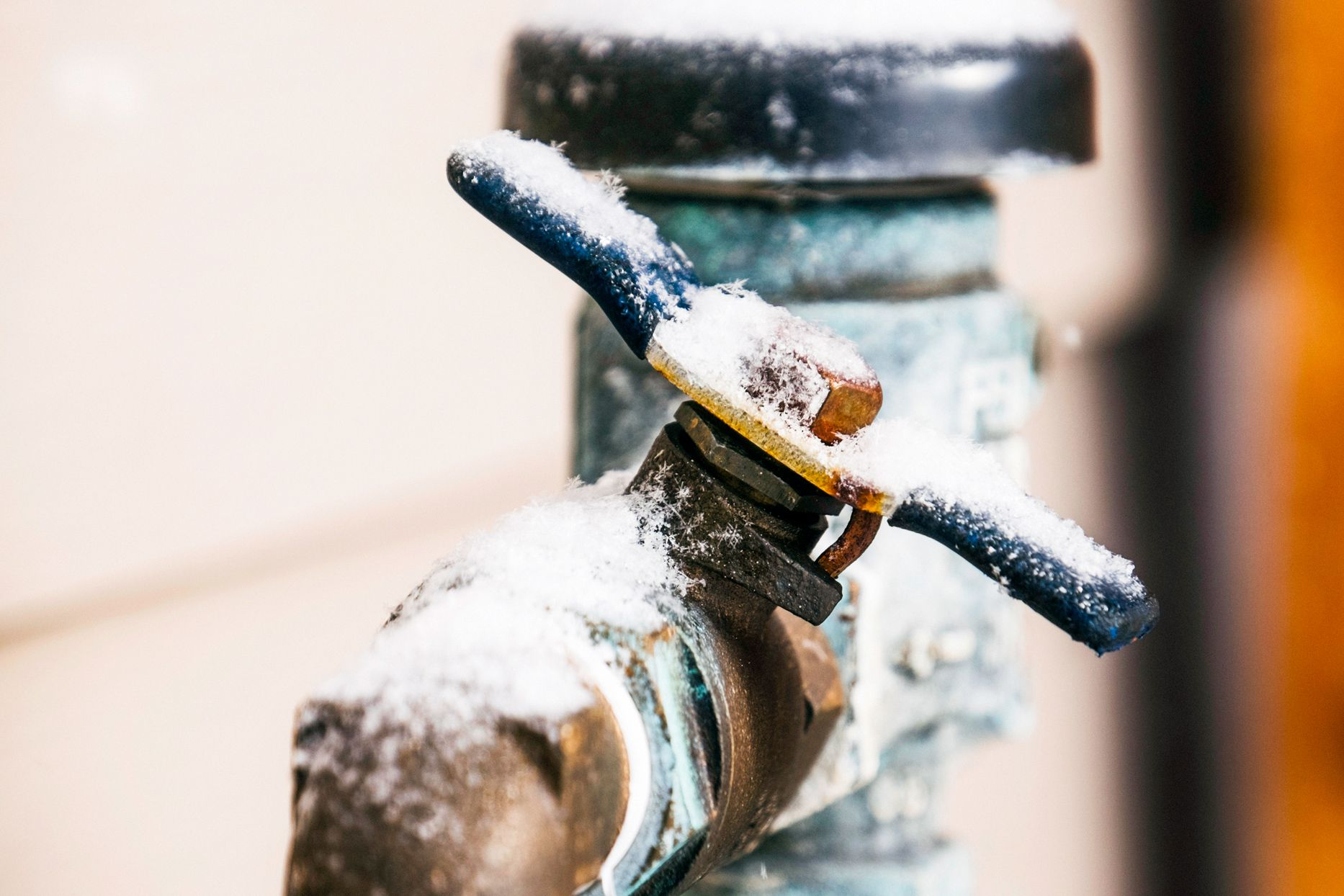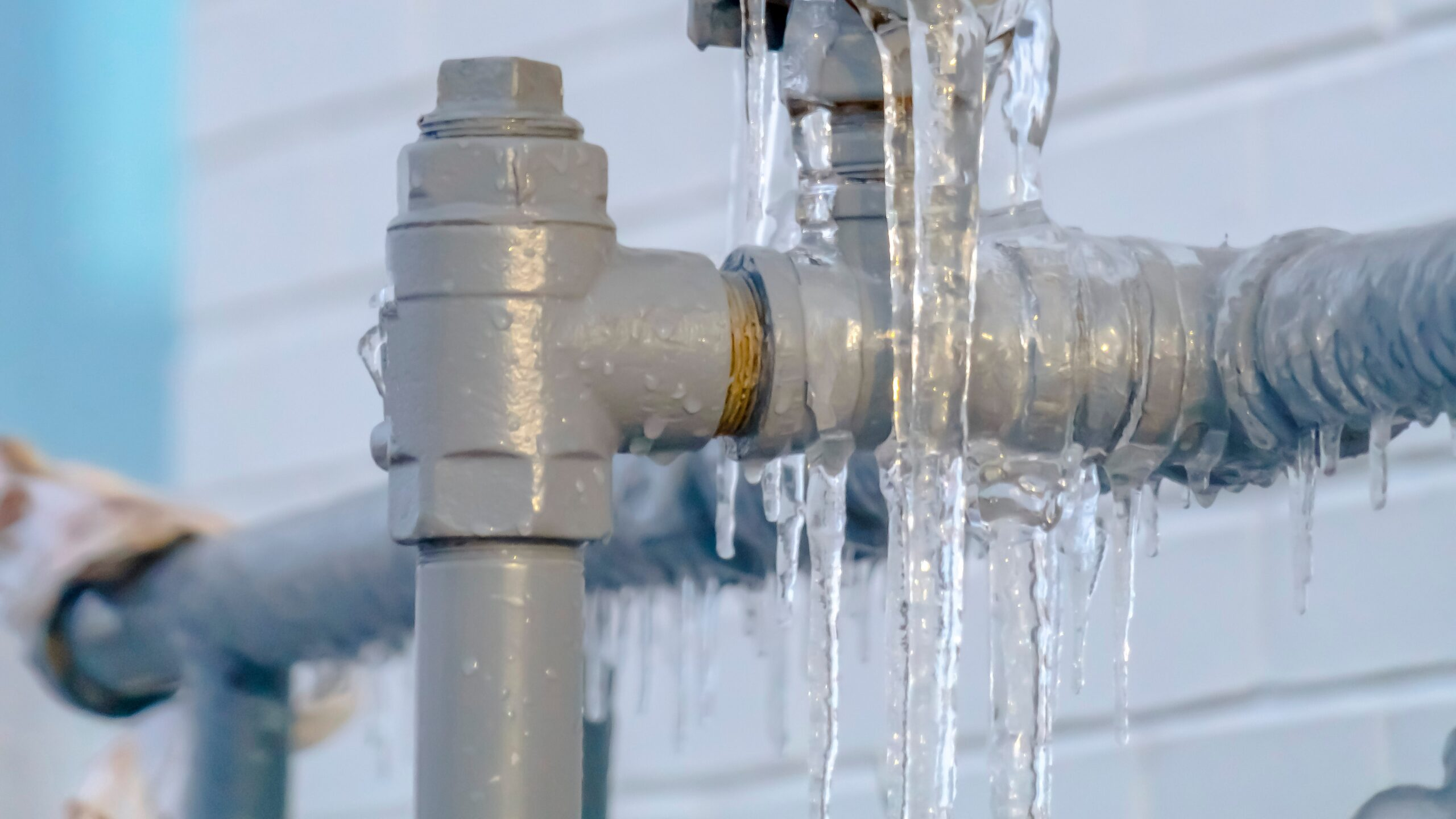Frozen pipes can be a major problem during winter months, causing inconvenience and expensive repairs for homeowners. When the temperature drops below freezing, exposed pipes are at risk of freezing and bursting, leading to water damage and disruption of daily activities.
However, there are several preventive measures that homeowners can take to prevent frozen pipes in their homes during winter. In this guide, we will discuss the causes of frozen pipes, signs to look out for, and effective ways to protect your home’s plumbing system from freezing temperatures.
What is a frozen pipe?
A frozen pipe is a plumbing issue that occurs when the temperature drops below freezing, causing water inside the pipes to freeze and expand. This expansion can cause the pipes to burst, leading to leaks and water damage in your home.
Pipes most at risk of freezing are those located in unheated or poorly insulated areas such as basements, attics, garages, and crawl spaces. In extreme cases, even interior pipes can freeze if they are not properly protected.
When water freezes inside a pipe, it creates pressure that can reach up to 2,000 pounds per square inch (psi). This pressure is enough to cause even strong metal or plastic pipes to burst. The resulting water damage can be costly to repair and can also lead to mold growth, structural damage, and health hazards.
Causes of frozen pipes
There are a few main causes of frozen pipes during winter. The first and most common cause is exposure to cold temperatures. When the temperature drops below freezing, water inside exposed or poorly insulated pipes can freeze and expand, leading to burst pipes.
Another cause is inadequate insulation. Pipes located in unheated areas or near exterior walls without proper insulation are at higher risk of freezing because they are not protected from the cold temperatures outside.
Poorly maintained heating systems can also contribute to frozen pipes. If your home’s heating system is not functioning properly, it may not be able to keep interior temperatures warm enough to prevent pipes from freezing.
Lastly, water supply lines located in exterior walls or under the foundation of your home are at risk of freezing due to their proximity to cold outdoor temperatures.
How To Prevent Frozen Pipes

There are several preventive measures that homeowners can take to protect their pipes from freezing during winter. Here are some effective ways to prevent frozen pipes:
Insulate exposed pipes
One of the most effective ways to prevent frozen pipes is by insulating any exposed pipes in your home. This can be done using foam pipe insulation, which is readily available at hardware stores and can easily be installed on your own. Make sure to cover all visible pipes, including those in unheated areas such as crawl spaces or attics.
Plus, insulating pipes can also help save energy and reduce your heating bill by keeping the hot water inside the pipes warmer for longer periods. Additionally, consider installing insulation on exterior walls and in areas where pipes run along them.
Keep your home warm
Maintaining a warm temperature inside your home can also help prevent pipes from freezing. Set your thermostat to at least 55 degrees Fahrenheit or higher, even when you are away from home. This will ensure that the interior of your home stays warm enough to prevent pipes from freezing.
If you plan on going away for an extended period during winter, it is important to have someone check on your home regularly and keep the heat running while you are away. Alternatively, you can also shut off the main water supply and drain all faucets before leaving.
Let faucets drip
Letting your faucets drip during extremely cold weather can also prevent frozen pipes. This allows a constant flow of water through the pipes, preventing them from freezing. It may seem counterintuitive to let your faucets run during winter, but it can save you from costly repairs in the long run.
It is recommended to let a slow drip come out of both hot and cold-water faucets in your home, especially those on exterior walls or in unheated areas. However, do not leave the faucet fully open as this can result in wasting large amounts of water.
Open cabinet doors under sinks
Another way to keep your pipes warm and prevent them from freezing is by opening the cabinet doors under your sinks. This will allow warm air from inside your home to circulate around the pipes, keeping them at a safe temperature.
Be sure to remove any cleaning products or chemicals from the cabinets before opening the doors. If you have young children or pets in your home, make sure to secure any harmful substances out of reach.
Use heat tape or pipe insulation
For added protection, consider using heat tape or pipe insulation on your pipes. Heat tape is a special electrical heating wire that can be wrapped around pipes to keep them warm during freezing temperatures. Pipe insulation, as mentioned earlier, provides an extra layer of protection and can also help save energy.
These options may require professional installation and should be used in conjunction with other preventive measures for maximum effectiveness. Plus, be sure to follow all safety guidelines and manufacturer instructions when using heat tape.
Shut off and drain outdoor water supply lines
Outdoor pipes, such as those used for sprinkler systems or garden hoses, are at high risk of freezing during winter. To prevent this, it is important to shut off the water supply and drain these pipes before the cold weather hits. This will remove any excess water from the pipes, reducing the chances of them freezing and bursting.
Be sure to also disconnect all garden hoses and store them indoors until spring. Additionally, consider installing frost-proof spigots on your exterior faucets to prevent them from freezing.
Seal any cracks or holes in exterior walls
Lastly, it is important to seal any cracks or holes in exterior walls of your home. These openings can allow cold air to seep into your home and directly onto pipes, increasing the risk of freezing. Use weather stripping or caulk to seal these gaps and prevent cold drafts from entering.
Regularly inspecting and maintaining the exterior of your home can also help identify any potential entry points for cold warmer air. Pay special attention to areas where pipes enter or exit your home, as these are common areas for cracks and gaps to form.
By following these preventive measures, you can protect your pipes from freezing during winter and avoid costly repairs. It is always better to take precautionary steps rather than dealing with the consequences of frozen pipes later on.
Why Frozen Pipes Are a Problem
Frozen pipes can be a major inconvenience and cause significant damage to your home. When water freezes inside a pipe, it expands and increases the pressure inside, leading to cracks or bursts in the pipe. This can result in water leakage and even flooding inside your home.
Not only does this cause potential structural damage, but it can also lead to mold growth if not properly addressed. Furthermore, repairing burst pipes can be costly and time-consuming, causing disruptions to your daily routine.
In addition, frozen pipes also prevent you from having access to running water until they are thawed out. This means no showers, washing dishes or doing laundry until the issue is resolved.
Moreover, if left untreated for an extended period, frozen pipes can also cause damage to your home’s heating and plumbing system. This can result in additional repairs and expenses.
How A Professional Plumber Can Help

If you are unsure about how to properly winterize your pipes or suspect that your pipes may be frozen, it is best to seek help from a professional plumber. They have the knowledge and experience to properly diagnose and fix any issues with your pipes.
A professional plumber can also provide valuable advice on preventive measures and maintenance tips for keeping your pipes safe during winter. They can also identify any potential vulnerabilities in your home’s plumbing system and offer solutions to address them.
In addition, hiring a professional plumber for regular maintenance check-ups can help catch any issues early on before they turn into major problems. This can save you time, money, and stress in the long run.
Remember, prevention is key when it comes to protecting your pipes from freezing during winter. By taking the necessary precautions and seeking help from a professional when needed, you can ensure that your pipes stay warm and functional all season long.
Contact Boldt’s Plumbing & Heating For Your Frozen Pipes and Plumbing Emergencies
Boldt Plumbing is a trusted and reputable company that provides top-notch services for all your plumbing, heating, and cooling needs. Their team of experts is dedicated to delivering the best possible solutions for any issue you may encounter, providing peace of mind to their customers.
One common concern when it comes to plumbing services is the fear of hidden issues or unexpected costs. However, Boldt Plumbing stands out by addressing these potential problems head-on. They prioritize attention to detail and work diligently to ensure customer satisfaction from start to finish. The team’s friendly and approachable demeanor only adds to the overall positive experience.
Aside from their expertise and commitment to customer happiness, Boldt Plumbing also offers flexible financing options for equipment replacement or installation projects. Furthermore, they have a discount club that offers year-round maintenance with discounts on tune-ups, repairs, and replacements. This is an excellent option for those looking to save money in the long run while still keeping their HVAC systems in top condition.
So call us at Baldwin: 715-684-3378 or Hudson: 715-386-4445 for any emergency services. You can trust Boldt Plumbing to handle any issue, from frozen pipes to air conditioning problems.
FAQs
How Can I Prevent Water Pipes from Freezing in Winter?
To prevent water pipes from freezing in winter, allow a cold water drip from faucets to keep the water moving. This simple step helps prevent the formation of ice within the water supply pipes.
What Should I Do to Protect Swimming Pool Supply Lines?
To protect swimming pool supply lines, drain and store them properly before winter. Additionally, disconnect outdoor hose bibs and ensure they are free of water to avoid freezing.
How Do I Thaw Frozen Pipes Safely?
To thaw frozen pipes safely, use an electric heating pad wrapped around the pipe. Alternatively, a portable space heater can be used to warm the area around the frozen pipe, helping to restore water flow.
When Should I Call a Licensed Plumber for Frozen Pipes?
If you cannot thaw frozen pipes or if you notice any damage, it is best to call a licensed plumber. They can assess and repair the issue, preventing further problems and potential workers comp claims due to unsafe conditions.
If you suspect that your pipes may be frozen or need help with winterizing your plumbing system, do not hesitate to contact a professional plumber like Boldt Plumbing. Their expertise and commitment to customer satisfaction will ensure that your pipes stay warm and functional all season long. Plus, their flexible financing options and discount club make maintaining your HVAC systems affordable and hassle-free.
